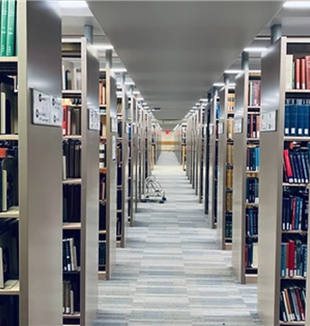
Beyond the Ivory Tower
As a graduate student in the midst of a pandemic, Letizia feels distanced from what is happening in the world--until an encounter that opens her to a larger horizon.Back in January, a few of us graduate students met with Giorgio Vittadini to share our questions and experiences regarding academic life. The conversation was lively and primarily centered around the perceived divide between our research, our faith, and what we termed “the rest of our lives.” Vittadini was emphatic in warning us against this seeming existential rupture, and we ended the gathering with a proposal of a continued life together.
Unfortunately, because of the pandemic, the way we expected this life to take form—through study weekends or cultural events—could no longer come to fruition. We each wrapped up our respective academic years physically isolated from others.
For me, the divide that Vitta was so keen on bridging became even more pronounced during this time when it seemed like the world was literally happening outside my door, even as I remained both physically and intellectually distanced from it. As a student of literature, my work seemed small and rather useless when compared with the global and national suffering.
My desire to meet again with the other graduate students was fueled by the conversations I had with my friend Annie, a fellow PhD student, during which we shared our common concerns regarding the state of the world and how that related to our research. Following the suggestion of Lele, one of the CLU responsibles with whom I have been in dialogue about graduate student initiatives, in June we reached out to astrophysicist Marco Bersanelli, a man who has dedicated his life to both science and the humanities without letting his heart die in the ivory tower. He agreed to meet us all on a video call.
The call we had with Bersanelli was well attended by both graduate students and faculty. We asked him several questions regarding the usefulness of our research, the difference between accepting one’s circumstances and being passive in front of a reality which is calling you to take action, the consuming pressure to succeed that so often plagues academics, and Fr. Giussani’s method as a mode to know things within our fields.
Bersanelli encouraged us to look at our research as a privileged opportunity to delve into reality in a profound way and to treat the work at hand as a key that opens us up to the larger horizon of reality. “This is our job,” he insisted. “And by doing that job, with the awareness of the large horizon that the Mystery of all things has, we can bring something unique into the detail and fabric of what we study.”
Like Vitta, Bersanelli stressed that “what unifies life is realizing that the Christian event is the seed of every interest, the source of every fascination. And therefore, it is only a matter of becoming aware that things are one, not making them one.” In response to a neuroscience student’s expressed desire to practice the scientific method with integrity, he emphasized, “You are touching on the need to be authentic with respect to the scientific method, and that is a sign of unity in your life. Your faith is helping you to be faithful to the scientific method.”
Bersanelli pressed us to ask ourselves what the biggest certainty in our lives is. This can help us break free from the narrow ways in which we measure ourselves and allow us to enjoy “the fullness of our lives and of the human experience” without losing dignity to the belief that we depend on our success.
Bersanelli concluded his time with us by urging us to remain true to the moment of awe and silence we experienced when we were first confronted with what fascinated us about our work. “If you are so lucky to have that moment of awareness, that will change your way of knowing,” he said to us. “It is [then] that you regain awareness of what you are studying. . . . To maintain this level of awareness that everything is given, it is important not to be alone.”
Read also - When quarantine "sounds" better
Bersanelli’s presence with us was already a testament to the fact that we are not on this journey alone. As a retired man connecting from Italy at 9:00 pm with a group of young Americans he did not even know, he had every right to remain distant and indifferent. Instead, he embraced us and welcomed us into his life, encouraging us to burst the bubbles that keep us detached from each other and from the world, and engage everything and everyone with curiosity, looking at our work not as a particularity or an intellectual niche that swallows us, but as a portal to all of reality.
The call was overall a manifestation of a life being lived, and that was for me a breath of fresh air. Everyone’s urgency and eagerness to be honest and serious in front of their work made it so that participating in this assembly ultimately was not just a matter of perceiving myself as less isolated, but also a reminder to take my work seriously, not merely on a level of professional performance, but also as something that captured my heart and through which I am fortunate enough to have a rapport with the world. I am thankful for this reminder and excited to continue on this journey together into the new academic year.
Letizia, Irvine, California